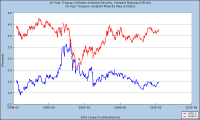To put it simply, our government has us so far in debt that they have one of three choices to pay it off: 1) Simply default on the debt (not likely); 2) raise taxes significantly on everyone to pay for it (even less likely); or 3) inflate the money supply so the debt can be repayed in cheaper dollars (this is essentially a hidden tax on we the people). The money supply used to be measured by an index called the M3, published by the Federal Reserve. They mysteriously announced a few short years ago that they would no longer publish the M3 -- telling people like me that they knew then what they were planning to do as far as inflating the currency to very high levels.
The interest on bonds is going up because no one is foolish enough to buy them anymore. The countries of the world with surpluses (China) are not stupid. They know that the US has no choice but to inflate the currency and make it worth less (and possibly even worthless). So, why buy US debt. When there are no buyers, rates go up to entice someone. China is already making deals for direct currency exchange with countries like Brazil, eliminating the US Dollar are the reserve currency of the world. When our Secretary of the Treasury was recently in China trying to assure them that their investment in the USA was safe, he was literally laughed at by college students whom he was addressing. Also, take note of how many other officials have been making trips to China to beg them not to dump the USD: Clinton, Pelosi, etc...
Inflation is coming and soon. The only real debate is whether it will just be high inflation or hyperinflation. And the ultimate question is what can you do to protect yourself? Do your best to keep your job, cut your expenses to the bone, save what you can, and become as self sufficient as possible. So. Md. will probably fare better than many parts of the country. The massive federal military dollars being spent here will likely persist to the very end.
P.S. If you're still in the stock market or mutual funds hoping to recover your lost thousands, you're likely to be in for a bigger disappointment. Its not a question of if the stock markets are going lower, but of exactly how low will they go. If you stay in, you probably won't break even for a very long long time, if ever...
The possible exception is being in tangible assets like precious metals, commodities and oil.
Good luck to everyone in dealing with what's coming.
If you want to learn more, go to You Tube and watch videos by Marc Faber, Jim Rogers and Peter Schiff, or go to
Financial Sense Newshour with Jim Puplava and listen to their excellent weekly financial news show.





